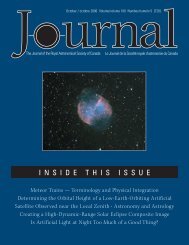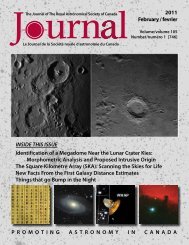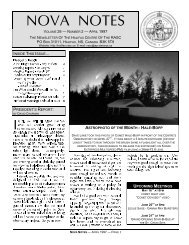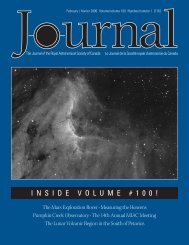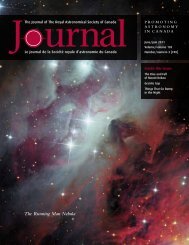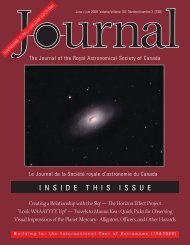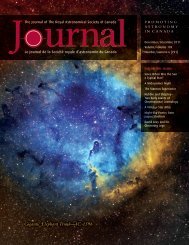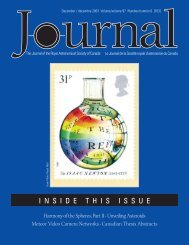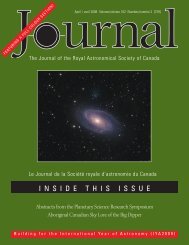Moment
insidethisissue - The Royal Astronomical Society of Canada
insidethisissue - The Royal Astronomical Society of Canada
You also want an ePaper? Increase the reach of your titles
YUMPU automatically turns print PDFs into web optimized ePapers that Google loves.
Feature ArticlesThe Helen Sawyer Hogg Memorial Lecture:The Art of Gentle Persuasionby Phil Plait, Bad Astronomy (thebadastronomer@gmail.com)IntroductionIn 1985, The Royal Astronomical Society of Canada (RASC)and the Canadian Astronomical Society (CASCA) began cosponsoringan annual lecture to celebrate the life and careerof Dr. Helen Sawyer Hogg, a Past President of both Societies.Dr. Hogg was interested in increasing public awareness andappreciation of the Universe, an aim also furthered by the annuallectures. These lectures are free, open to the public, and held atthe RASC or CASCA Annual Meetings in alternating years.At the General Assembly in Toronto last summer, Dr. PhilPlait, the author of the books Bad Astronomy and Death Fromthe Skies, gave the Helen Sawyer Hogg Memorial Lecture.More information on the lecture can be found on the RASCWeb site www.rasc.ca/programs/lectures.shtmlThe Art of Gentle Persuasion— Randy Attwood, Mississauga CentrePhil Plait, the creator of BadAstronomy, delivered the 2008Helen Sawyer Hogg MemorialLecture.I’ve often wondered whatwould happen if we could takea census of the ideas in ourheads. We could look at themone at a time and throw theminto bins marked “Correct” or“Not so much.”Which bin do you thinkwould overflow first?Don’t side with “correct”so quickly. For example,antioxidants are good for you,right? I see advertisements forproducts with antioxidantsin them, news reports wherethey point out antioxidantladenmeal ideas, and food labels proudly displaying their levelof antioxidation.But now I’m also starting to see reports that maybeantioxidants aren’t all that great. Maybe they don’t do much atall, if anything.How much of my brain is loaded with antioxidantpropaganda? Well, maybe only a wayward synapse or two. Butthat’s just one narrow topic. What other medical informationhave I misplaced or misfiled or been misled about? How aboutgeology? Zoology? Movie trivia?Or, what about — gasp — astronomy?My brain is loaded with astronomy information. I can rattleoff NGC numbers, RAs and Decs, moons, planets, supernovaedates and distances, filter bandpasses... but what’s the currentthinking on dark energy? How far away is the AndromedaGalaxy? Can you get out of a black hole?Those ideas change with time, or with bettermeasurements. I read a lot, so I try to keep up, and I have somesmall experience with these ideas. You and I are familiar with alot of these things, and I bet we can usually sniff out the wrongstuff, the misremembered, and the outright hoaxed.But what about the public? The vast majority of peoplewho don’t live and breathe astronomy have been shownthrough various surveys to have only a tenuous knowledge ofastronomy. In the U.S., half the population doesn’t know theEarth goes around the Sun and takes a year to do it.Getting useful knowledge out to teeming millions isalready hard enough. Facing impediments of previouslyacquired bad astronomy makes it almost impossible.Worse, some studies have shown that people tend toremember wrong information even after it’s been corrected.You can explain to them patiently and scientifically just exactlyhow Rayleigh scattering works, but a month later they’ll stillthink the sky is blue because the sky reflects light from theocean.Purely by accident — no one would do this on purpose —I’ve devoted my professional life to this issue. I’ve found thatthere may be ways to achieve the seemingly insurmountablegoal of teaching good astronomy to the public and weedingout the bad. Ironically, I have no scientific basis for mymethodology, except to keep doing what works and abandonwhat doesn’t (which, to be fair, is a pretty good one-linesynopsis of experimental science). But, happily, a lot of thingsdo work: using what interests people is a good place to start.Being friendly is another. And, above all, don’t forget to bringthe funny.OK, first: interesting stuff. This may shock you, butpeople pay more attention to things that interest them. If you52 Celebrating the International Year of Astronomy (IYA2009)JRASC April / avril 2009



